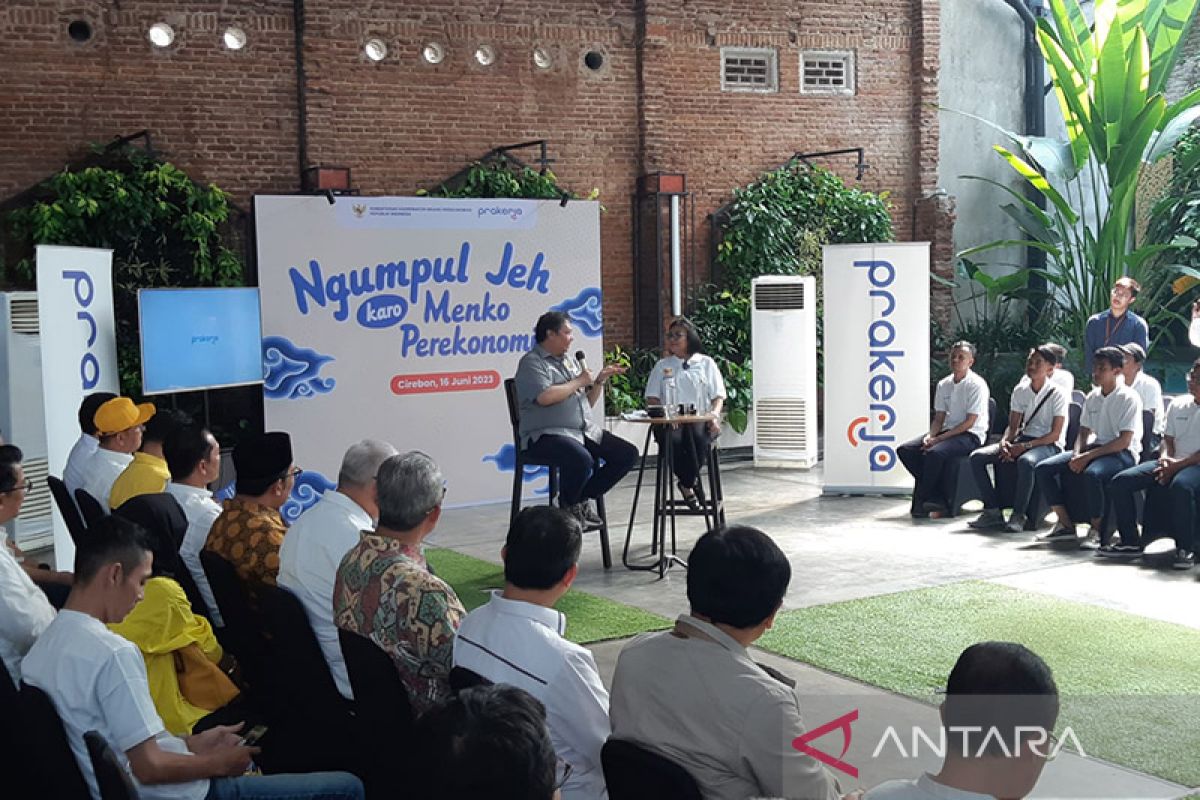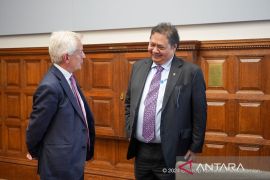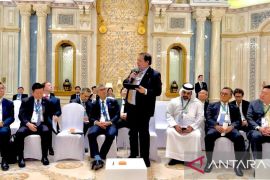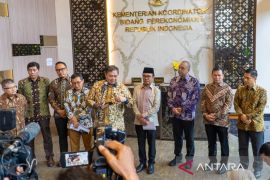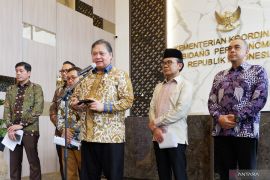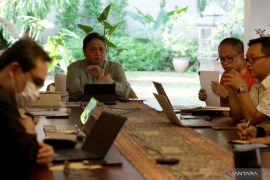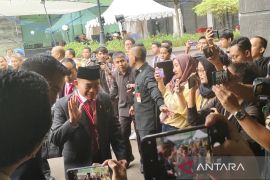“I joined the Pre-Employment Program in 2020. After that, I was able to open a small booth to sell snacks. Thank God, the business is growing, and I am able to sell more menus,” Dina stated.
Dina also spoke of having become a speaker at several entrepreneurship seminars based on the knowledge she had gained while attending micro, small, and medium (MSMEs) training classes through the Pre-Employment Program. She admitted that the program helped her to acquire new knowledge and instilled in her the courage to open her own culinary business.
Another alumnus, Syarif Fauzi, was also able to derive similar benefits and clock similar achievement. Due to his participation in the program, Fauzi was able to run a food cart, and now, he already has five carts.
"I am one of the alumni, who was really helped by the program because I took the MSME training, and three months later, I can start and run my business until now,” he remarked.
Dina and Syarif are two of the millions of participants in the Pre-Employment Card Program whose fate has been changed by the program from the government.
The Pre-Employment Card Program is a work and entrepreneurship competency development and training program funded by the government for job seekers, workers and laborers affected by the termination of employment and/or workers and laborers in need of competency improvement, including micro and small business actors.
Related news: Govt aiming to register one mln Prakerja beneficiaries in 2023
Employment rate
Several alumnus showed their enthusiasm during the gathering. Hundreds of alumni selected from each district and city in West Java gathered and enjoyed a meal while chatting and exchanging experiences with other fellow alumni.
Coordinating Minister for Economic Affairs, Airlangga Hartarto, and Executive Director of Implementing Management for the Pre-Employment Card Program, Denni Puspa Purbasari, also attended the gathering.
During the session, the alumni were given the opportunity to ask questions, offer criticism and suggestions, and share their experiences while running a business.
Based on data provided by the Implementing Management (PMO) of the Pre-Employment Card Program for the first quarter of 2023, some 24 percent of the Pre-Employment participants, who were initially unemployed, claimed to have gotten a job or even started a business after completing the course and receive incentives from Pre-Employment. This figure is certainly a breath of fresh air to boost the level of productivity of the Indonesian people in welcoming the 2045 Golden Indonesia Vision.
This year, the Indonesian government has implemented the Normal Scheme for the Pre-Employment Card Program. Each participant will receive Rp4.2 million from the program, comprising Rp3.5 million for training assistance, Rp600 thousand for post-training incentives, and Rp100 thousand for filling out the survey twice.
Minister Hartarto noted that since 2020 until now, up to 17 million participants had joined the Pre-Employment Card Program.
With that figure, he noted that this program is quite massive and absorbed 54 percent of women participants, with an educational background below the high school level. After graduating from the program, some get new jobs, while others become entrepreneurs or MSMEs owners. One of the focuses of this program is the government’s goal to continue development and empowerment in this country.
The pre-employment program also aims to boost people’s productivity and make the most of the demographic bonus.
Until now, the program has been implemented in 514 districts and cities and is targeted to reach one million participants, with a total budget of Rp4.37 trillion. By starting to use the normal scheme, this year, the number of pre-employment recipients was recorded at 490 thousand participants, with an initial target of 595 thousand participants through a budget set at Rp2.67 trillion.
Meanwhile, specifically for 2023, the program is targeted to reach one million participants, with a total budget of Rp4.37 trillion.
The Pre-Employment Card Program Implementing Management stated that apart from increasing community employment opportunities, the program also has vast potential to cut the skills gap between men and women in a professional context.
For 2023, the proportion of female participants in the pre-employment program has reached 54 percent. This figure shows an increase of six percent as compared to only 51 percent during the 2020-2022 period.
Moreover, the age distribution of program beneficiaries was also dominated by those in the age bracket of 18-25 years that was recorded at 36 percent, followed by 33 percent in the age band of 26-35 years. Age distribution of the participants is different as compared to the Pre-Employment period of 2020-2022 that was dominated by people in the age group of 26-35 years, reaching 34 percent.
Related news: Prakerja to open registrations for new batches every two weeks
Limited digital access
When views were sought regarding the abuse of Pre-Employment, Executive Director of Pre-Employment Denni Puspa Purbasari highlighted that every government program must have loopholes for irresponsible people to take advantage of, and Pre-Employment is no exception. Misuse of programs, such as pre-employment test jockeys by irresponsible persons is one of the obstacles faced by the government in distributing the benefits of pre-employment to the public.
Currently, the Management of the Pre-Employment Program is only able to minimize the possibility and strives to cover this gap by utilizing a security system using Face Recognition technology or Facial Biometrics, as well as code authorization via the participant's telephone number.
In addition, another challenge faced by the team is limited digital access at 16 locations in the Papua region. The uneven distribution of digitalization means that the program has not been able to reach the people in the easternmost region of Indonesia.
The team then addressed this problem by utilizing the Pre-Employment alumni network spread across Indonesia. Through this solidarity, the alumni have helped to reach remote areas that still lack access to digitalization.
Human resource productivity
During an intimate discussion session with the media crew, some of the alumni agreed that the Normal Scheme in this year's Pre-Employment Program was more effective than in the previous years. With the availability of ample offline or offline training, the learning process can become more interactive and effective.
Amin, one of the snack traders, who was one of the 2020 Pre-Employment alumni, stated that participants this year are finding it easier to access face-to-face learning. It is different from his batch when he took part in online pre-employment, as he was impacted by the COVID-19 pandemic.
On the same occasion, Minister Hartarto assured the alumni that the pre-employment program would continue. In fact, the Pre-Employment Card Program continues to be developed, one of which is through skill weeks that the Pre-Employment alumni can participate in for developing their knowledge.
However, Indonesia is currently facing a demographic bonus that can be utilized as an opportunity to get out of the middle-income trap (MIT). However, behind the demographic bonus, the human resource sector must be further boosted to gain productivity. One of the efforts that can be made to increase productivity is through the Pre-Employment Card Program.
The minister is optimistic about this matter since the Pre-Employment Card Program is the first social assistance program to use an education and training scheme as well as an effective government-to-people (G-to-P) program to reach the community directly.
This program can be said to become the first service from the government to citizens or to the community. This program is also the first e-government program in Indonesia that can be used as an example and benchmark for other public services.
Related news: Above-30 workers should upgrade their skills: Executive Director
Related news: Minister highlights benefits offered by Pre-employment Card
Editor: Yuni Arisandy Sinaga
Copyright © ANTARA 2023
